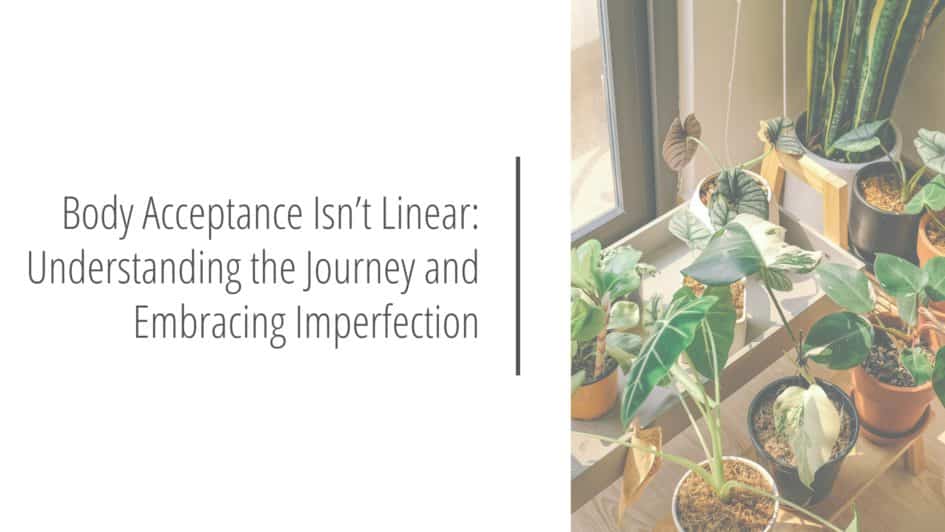Table of Contents
The Ebb and Flow of Body Image
It’s easy to portray body acceptance as a one-way street. We tend to think that once we reach a place of self-love and acceptance, we’ll never look back. We imagine that negative thoughts will disappear forever, leaving us confident every day. But that’s not how it works.
The truth is, body acceptance isn’t linear, because life isn’t linear. Just as life ebbs and flows, so does body image. Some days, we feel confident and at peace. Other days, a comment, a photo, or even our mood can bring body insecurities rushing back.
And that’s okay! Body acceptance is about progress, not perfection. It’s about learning to navigate the ups and downs with compassion, knowing that setbacks are part of the journey, not a failure.
Why Acceptance Might Not Be Permanent
It’s reasonable to expect that body acceptance is a permanent state of mind. We might think that once we “accept” our bodies, we’ll never have a negative thought about them again. But that’s not how life works. Just as our bodies are constantly changing, so are our thoughts and feelings about them.
Why We Expect Linear Progress
Society loves the idea of linear progress. We’re taught that success means constantly moving forward without setbacks. But when it comes to body acceptance, this mindset can be damaging. The truth is, no one is immune to bad body image days, no matter how far along they are on their journey.
Life Changes, and So Do Our Bodies
Our bodies are not static. They change with age, health, lifestyle, and countless other factors. And with these changes come shifting perceptions of our bodies.
Health and Body Image
Health challenges can dramatically alter our body image. Whether it’s weight gain from medication, muscle loss from illness, scars from surgery, or stretch marks from pregnancy, physical changes can be difficult to accept. Studies have shown that chronic illness and body changes are linked to body dissatisfaction (Cash & Smolak, 2011). This doesn’t mean we’ve failed at body acceptance; it means we’re human.
Emotional and Mental Health
Mental health can also impact how we see ourselves. Anxiety, depression, and stress can warp our perception, leading to more negative body image days. When our minds are clouded by mental health struggles, it’s easy to fall back into old patterns of self-criticism.
External Influences: Comments and Comparisons
Even the most confident person can be shaken by an offhand comment or an unrealistic image on social media. We live in a world that constantly tells us how we should look, and it’s normal to be affected by that.
The Power of Words
A small, seemingly innocent comment can send us spiraling. This doesn’t mean we’re weak or that we’ve failed at body acceptance; it means we’re sensitive to the opinions of others, as most humans are.
Social Media and Comparison
Social media can be both inspiring and damaging. It’s easy to compare our behind-the-scenes to someone else’s highlight reel. Research shows that social media use is linked to body dissatisfaction (Fardouly et al., 2015). If we’re in a vulnerable place, it’s normal for comparisons to affect us more deeply.
Seasons of Life and Body Acceptance
Just as life has seasons, so does body acceptance. There will be seasons of confidence and seasons of doubt, and that’s completely normal.
It’s Okay to Struggle
There may be times when you feel at war with your body. This doesn’t mean you’ve failed; it means you’re experiencing a difficult season. The goal isn’t to never struggle but to keep working toward acceptance, even if you lose sight of it temporarily.
The Long-Term Goal
What matters most is the long-term goal of body acceptance. Even when life throws curveballs and self-doubt creeps in, the goal remains the same: to accept and appreciate your body for what it is, not what it looks like.
How to Nurture Body Acceptance
Body acceptance isn’t about perfection; it’s about persistence. It’s about showing yourself grace and compassion, especially on the hard days. Navigating body acceptance when life throws curveballs can feel overwhelming. But there are strategies that can help you maintain a sense of balance and perspective.
Practice Self-Compassion
Instead of criticizing yourself for having a bad body image day, practice self-compassion. Acknowledge your feelings without judgment and remind yourself that it’s okay to struggle. Research shows that self-compassion can improve body satisfaction and reduce the impact of negative body image thoughts (Albertson et al., 2015).
Reframe Negative Thoughts
When negative body thoughts arise, try to reframe them with a more neutral or positive perspective. For example, instead of thinking, “I hate my body,” reframe it as, “I’m struggling with my body image today, but my worth is not defined by my appearance.” This shift in mindset can help reduce the emotional impact of negative thoughts.
Surround Yourself with Positive Influences
The people you surround yourself with and the media you consume can significantly influence your body image. Follow body-positive influencers, engage with communities that promote body acceptance, and distance yourself from toxic environments that trigger negative self-perception.
Focus on What Your Body Can Do
Shifting focus from appearance to functionality can be a powerful way to support body acceptance. Celebrate what your body allows you to do, whether it’s laughing, hugging loved ones, or simply getting through a tough day. Joyful movement and gratitude for your body’s abilities can foster a more positive relationship with it.
Seek Support When Needed
It’s okay to seek help when body acceptance feels out of reach. This could be talking to a trusted friend, joining a support group, or seeking professional help from a therapist who specializes in body image issues. There’s no shame in needing support!
Final Thoughts
Body acceptance isn’t a one-and-done achievement. It’s a lifelong journey that ebbs and flows with the seasons of life. What matters most is that you keep moving forward, even when it feels like you’ve taken a step back.
You haven’t failed body acceptance just because you’re struggling. You’re simply human, navigating life. And that’s perfectly okay.
Thanks for reading!
Rachel Beiler, MHS, RD, LDN
References
- Cash, T. F., & Smolak, L. (2011). Body Image: A Handbook of Science, Practice, and Prevention. Guilford Press.
- Fardouly, J., Diedrichs, P. C., Vartanian, L. R., & Halliwell, E. (2015). Social comparisons on social media: The impact of Facebook on young women’s body image concerns and mood. Body Image, 13, 38-45.
- Albertson, E. R., Neff, K. D., & Dill-Shackleford, K. E. (2015). Self-compassion and body dissatisfaction in women: A randomized controlled trial of a brief meditation intervention. Mindfulness, 6(3), 444-454.


Leave a Reply